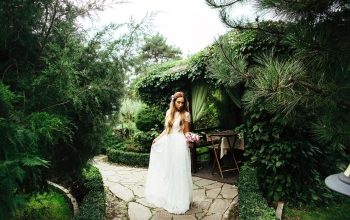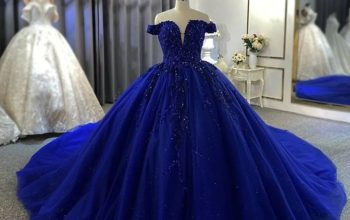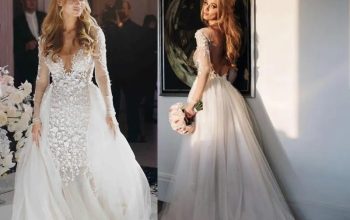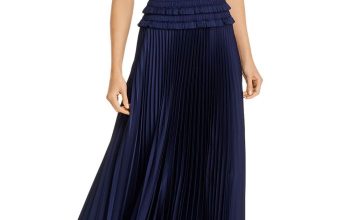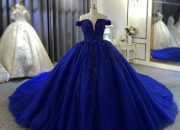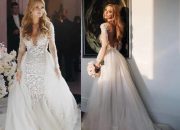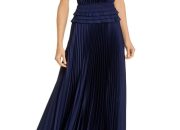Nigerian Wedding Dress Styles: A Diverse Landscape
Nigerian style wedding dresses – Nigerian wedding attire showcases a vibrant tapestry of cultural heritage, reflecting the nation’s diverse ethnic groups and regional traditions. The styles, fabrics, and embellishments vary significantly across different regions, creating a rich and multifaceted landscape of bridal fashion.
Regional Variations in Nigerian Wedding Dress Styles
The diversity of Nigerian wedding dresses is a direct reflection of the country’s rich ethnic tapestry. Styles vary significantly across regions, influenced by local traditions and available resources. For instance, Yoruba brides often opt for elaborate aso oke ensembles, while Igbo brides might favor intricate lace or Ankara styles. Northern Nigerian brides frequently choose more modest designs, often incorporating rich embroidery and embellishments.
The Significance of Fabrics in Nigerian Bridal Wear
Certain fabrics hold significant cultural weight in Nigerian bridal fashion. Aso Oke, a hand-woven cloth known for its intricate patterns and vibrant colors, is a staple in many Yoruba weddings. Lace, often imported and adorned with intricate beading or embroidery, is popular across various regions, representing sophistication and elegance. Ankara, a vibrant printed cotton fabric, is widely used for its versatility and bold designs, embodying a modern and celebratory spirit.
Evolution of Nigerian Wedding Dress Styles
Nigerian wedding fashion has evolved significantly over time, reflecting changing social norms and global influences. Traditional styles, once heavily reliant on locally sourced materials and techniques, now incorporate modern designs and imported fabrics. The incorporation of lace, for example, marks a significant shift towards more contemporary aesthetics. Yet, the core cultural significance of these garments remains steadfast.
Table of Regional Nigerian Wedding Dress Styles
| Region | Typical Fabric | Common Style Elements | Notable Features |
|---|---|---|---|
| Yoruba (Southwest) | Aso Oke | Iro and Buba, elaborate headwraps (Gele) | Intricate weaving patterns, rich colors |
| Igbo (Southeast) | Lace, Ankara | Fitted bodice, flared skirt, elaborate beading | Modern and stylish designs, vibrant colors |
| Hausa/Fulani (North) | Brocade, Embroidery | Long, flowing gowns, modest designs | Intricate embroidery, often in muted tones |
| Edo (South-South) | Aso Oke, Lace | Unique headpieces, ornate jewelry | Blends traditional and modern elements |
Colors and Symbolism in Nigerian Wedding Attire: Nigerian Style Wedding Dresses
Color plays a significant role in Nigerian weddings, carrying deep cultural and symbolic meaning. Different colors are associated with various tribes, regions, and even specific events within the wedding ceremony. The bride’s choice of colors often reflects her personality and the overall theme of the wedding.
Cultural Significance of Colors in Nigerian Weddings
In many Nigerian cultures, specific colors carry symbolic weight. For example, white often signifies purity and innocence, while red represents joy, love, and fertility. Other colors like gold, green, and blue hold distinct meanings depending on the specific region and tribe.
Color Palettes and Their Symbolic Meanings
Several color palettes are commonly used in Nigerian weddings, each conveying a unique mood and cultural context. A combination of coral, gold, and ivory might represent richness and tradition, while a palette of emerald green, gold, and burgundy could signify prosperity and elegance. Bold colors like fuchsia, orange, and turquoise represent a modern and vibrant celebration.
Examples of Nigerian Wedding Color Palettes
- Palette 1: Traditional Elegance: Deep gold, rich burgundy, and ivory. This evokes a sense of classic elegance and tradition, often seen in Yoruba weddings.
- Palette 2: Modern Vibrancy: Fuchsia, coral, and turquoise. This represents a bold and contemporary celebration, ideal for couples seeking a modern twist on tradition.
- Palette 3: Serene Sophistication: Emerald green, gold, and blush pink. This palette signifies a refined and graceful celebration, suggesting serenity and prosperity.
Accessories and Adornments in Nigerian Bridal Fashion
Accessories play a crucial role in completing the Nigerian bridal look, adding layers of cultural significance and personal expression. From elaborate headwraps to intricate jewelry and traditional footwear, these adornments enhance the overall aesthetic and reflect the bride’s heritage.
Cultural Significance of Bridal Accessories
The choice of accessories is not arbitrary; they often carry profound cultural meanings. Headwraps (Gele), for instance, are more than just fashion statements; they are symbols of status, respect, and cultural identity. Jewelry, often passed down through generations, holds sentimental value and reflects family heritage.
Examples of Traditional and Modern Accessories
Traditional accessories might include coral beads, elaborate necklaces, and handcrafted footwear. Modern interpretations incorporate contemporary designs while retaining cultural relevance, such as combining traditional beadwork with modern jewelry settings.
Key Bridal Accessories and Their Significance
- Gele (Headwrap): A symbol of elegance and status, reflecting the bride’s cultural identity and regional background.
- Coral Beads: Often signifying prosperity and good fortune, frequently used in necklaces and bracelets.
- Traditional Jewelry: Passed down through generations, carrying sentimental value and reflecting family heritage.
- Handcrafted Footwear: Adding a touch of cultural authenticity and often reflecting the bride’s regional origins.
- Embroidered Bags/Clutches: Matching the dress fabric, enhancing the overall ensemble with intricate designs.
Modern Interpretations of Traditional Nigerian Wedding Dresses
Contemporary Nigerian bridal fashion skillfully blends traditional elements with modern designs, creating unique and stylish ensembles. Modern designers often incorporate traditional fabrics and embellishments into contemporary silhouettes, resulting in a fusion of classic and contemporary aesthetics.
Fusion of Traditional and Modern Styles
The fusion is evident in the use of traditional fabrics like Aso Oke and Ankara in modern silhouettes such as A-line gowns, mermaid dresses, and even jumpsuits. Intricate beadwork and embroidery, characteristic of traditional styles, are often incorporated into modern designs, adding a touch of cultural authenticity.
Modern Wedding Dress Designs Inspired by Tradition
- Design 1: A modern A-line gown crafted from vibrant Ankara fabric, featuring a plunging neckline and delicate beading along the bodice. This design blends a contemporary silhouette with a bold, culturally relevant fabric.
- Design 2: A mermaid-style gown made from luxurious Aso Oke, incorporating intricate embroidery along the neckline and sleeves. This design retains the elegance of traditional Aso Oke while embracing a contemporary silhouette.
- Design 3: A sleek jumpsuit crafted from richly textured lace, accented with traditional coral beading at the waist and shoulders. This design offers a modern, yet culturally significant, alternative to a traditional gown.
The Role of the Gele (Headwrap) in Nigerian Bridal Style
The Gele, a headwrap intricately tied, is an essential element of Nigerian bridal attire. It’s more than just an accessory; it’s a statement of elegance, cultural identity, and artistic expression. The style and technique of tying a Gele vary significantly across regions and tribes.
Styles and Techniques of Tying a Gele
Numerous Gele styles exist, each with its unique technique and aesthetic. Some are simple and elegant, while others are elaborate and intricate, requiring considerable skill and precision. The choice of style often reflects the bride’s personal preference and cultural background.
Nigerian style wedding dresses are renowned for their vibrant colors and intricate designs, often reflecting rich cultural heritage. However, if you’re planning a more understated reception, consider a palette inspired by the elegance of beige wohnzimmer möbel , which translates beautifully into subtle, sophisticated bridesmaid dresses or even the wedding décor itself. The result? A refined aesthetic that still captures the essence of a Nigerian celebration.
Cultural Significance of the Gele, Nigerian style wedding dresses
The Gele is a powerful symbol of cultural identity and tradition. It signifies respect, elegance, and sophistication. The complexity and artistry involved in tying a Gele showcase the bride’s beauty and the rich cultural heritage of Nigeria.
Step-by-Step Guide to Tying a Simple Gele
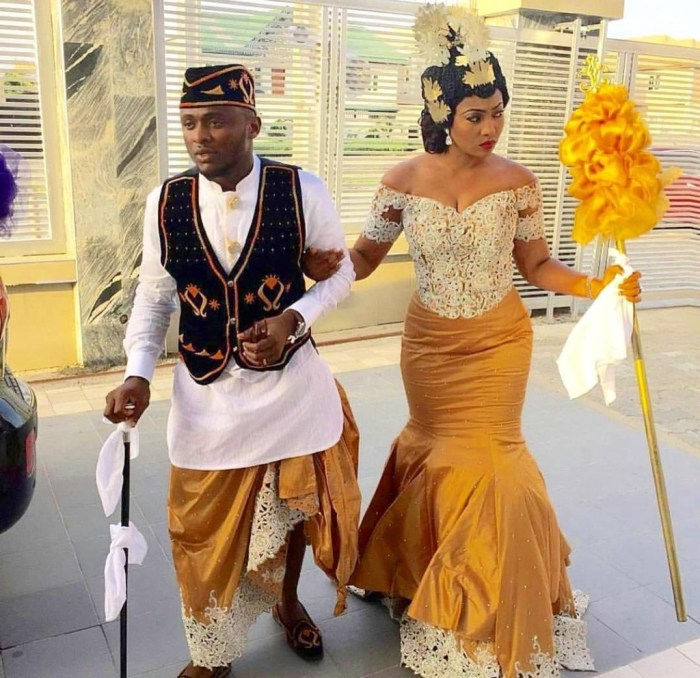
Source: buzznigeria.com
- Start with a rectangular piece of Gele fabric.
- Fold the fabric in half lengthwise to create a long strip.
- Place the folded fabric on your head, with the edges aligned at the back.
- Wrap the fabric around your head, securing it at the back with pins.
- Fold and drape the remaining fabric to create the desired style.
- Secure with additional pins to maintain the shape.
Illustrating Nigerian Wedding Dress Designs
Nigerian wedding dresses are characterized by their vibrant colors, intricate details, and cultural significance. The designs showcase a remarkable blend of tradition and modernity, reflecting the nation’s diverse heritage.
A Richly Detailed Aso Oke Wedding Dress
Imagine a flowing A-line gown crafted from deep emerald green Aso Oke. The bodice features intricate beadwork depicting traditional Yoruba motifs, cascading down to the waist. The neckline is a modest sweetheart shape, complemented by delicate, matching beadwork embellishments on the sleeves.
A Modern Lace Wedding Dress
Envision a sleek, mermaid-style gown fashioned from ivory lace, delicately embroidered with floral patterns. The silhouette accentuates the bride’s figure, while the lace adds a touch of modern elegance. The neckline is a simple scoop, allowing the intricate lace detailing to take center stage.
A Traditional Edo Wedding Dress
Picture a vibrant coral-colored dress made from richly textured Aso Oke. The design incorporates traditional Edo embroidery along the bodice and sleeves, featuring geometric patterns and symbolic motifs. The dress is paired with a unique, ornate Edo headpiece and traditional coral bead necklaces.
FAQ Section
How much do Nigerian wedding dresses typically cost?
The cost varies greatly depending on the fabric, embellishments, designer, and complexity of the design. Prices can range from a few hundred to several thousand dollars.
Where can I find Nigerian wedding dress designers?
Many Nigerian designers have online presences and may ship internationally. You can also find designers through bridal boutiques specializing in cultural attire.
Can I customize a Nigerian wedding dress?
Yes, many designers offer customization options allowing you to personalize fabrics, colors, and embellishments to create a truly unique dress.
What is the best time of year to purchase a Nigerian wedding dress?
It’s advisable to start shopping well in advance of your wedding date, allowing ample time for design, alterations, and shipping.

